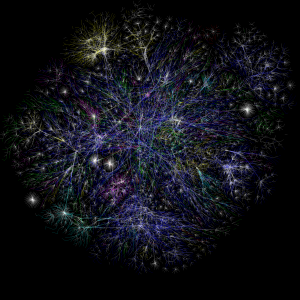Archive
Web 3.0: Back to the Future?
Internet usage is soaring around the world, threatening aspects of Google and YouTube’s business model, aimed at generating advertising revenue from otherwise free content. In particular, increasing demand for video downloads is driving up infrastructure costs, through server upgrades and energy usage. Similar news has appeared for Yahoo, which is looking down the barrel of having to announce profit warnings and staff cuts.
What does this mean for video over the web, or the Internet as a whole? It means, at this point, that the concept of centralized, mass distribution of information is inefficient and may break a company that tries to profit from it.
It’s great news, actually. The biggest threat to the Internet, the very thing the Internet was designed to counteract, is the centralization of information. If the only way to find something on the net is to go through a monolithic organization, the entire world’s perception of what is available can be controlled by that organization. This, after all, is the commercial model which Google and friends are ultimately geared towards, yet they are now threatened by their own weight.
In contrast, the distributed model of information storage makes all the sense in the world. If something is timely and interesting, it will have a broader audience. A peer to peer network reflects this by an increased number of seeders. As a result, the access of the more popular information becomes faster as the load on any single source is lessened. The beauty of this system is that, since the information is stored on thousands, even millions of computers worldwide, that information cannot be obliterated with any ease.
The role remains for websites to continue to offer summaries and lists of new items, but the items themselves need to be set free into the community to live or perish, depending on their merit, as judged by the viewers themselves. Alternatively, even this could become an obsolete model, as peer to peer networks could be developed to provide a meaningful search capability, especially if latency times decrease.
The future for the Internet will ultimately be determined by what is the most efficient way forward. Before the Internet, in the early days of home computing where modems, if any, were 300 baud (and too slow for anything more than text transmissions), files were shared on floppy disks. As slow as it was, this was still an efficient method of distribution, as each computer could make multiple copies of a disk, or the disk could make a trip to dozens of homes. Sharing a game or a document was quite easy, perhaps even easier then than it is now. It is fair to predict that, with the maturation of peer to peer networking, that the decentralized information sharing model will usurp the Google monolith and set information free once more.
I, for one, welcome our decentralized overlords.
